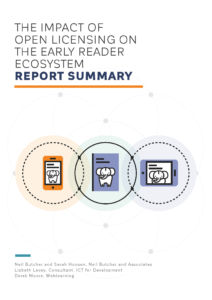 Authors: Neil Butcher, Sarah Hoosen, Lisbeth Levey, and Derek Moore
Authors: Neil Butcher, Sarah Hoosen, Lisbeth Levey, and Derek Moore
Summary: Developing early literacy requires access to structured decodable texts and levelled readers, an array of supplementary reading materials (SRMs), and teachers trained in literacy development methods and teaching in language/s spoken in the school where they teach. As children acquire literacy most effectively in their mother tongue, this introduces a significant barrier for those who live in low-income countries and speak local languages for which there is not a viable publishing industry. Even where content has been created, the supply chains that are needed to print and distribute educational materials are typically under-funded, inefficient, and often susceptible to corruption. In addition, these supply chains are often inequitable, are based on unreliable school statistics, have storage and stock control systems that are substandard, depend on poor transportation facilities, and are negatively affected by delayed payments from governments.
The problems affecting early literacy have been well documented. However, research in this field has tended to focus on traditional publishing value and supply chains, without taking much account of new possibilities that might be ushered in as a consequence of the digitization of content and how the use of open licences might create new approaches and solutions to these seemingly intractable problems. Consequently, this report focuses its attention on the development of value networks based on open licensing and the extent to which these might meet the demands for materials in this critical educational sector. We also devote attention to organizations that promote use, such as libraries. A concomitant focus on local in-country value network strengths and weaknesses is also emphasized because sustainability over the long run will require tapping into indigenous publishing, print, distribution, and use mechanisms.
Full Report: http://www.nba.co.za/sites/default/files/Early%20Literacy%20and%20Open%20Licensing%20Summary%20Report.pdf




